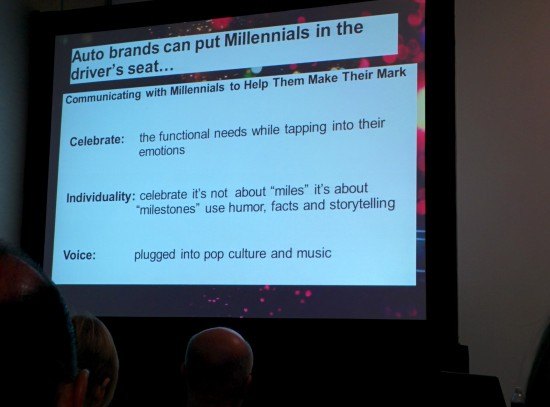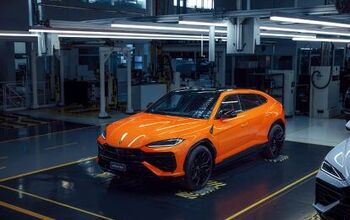NADA Conference 2015: Here's the Background Behind That MTV Study on Millennials and Cars
Over the past weekend, you’ve probably seen the summaries of press releases interspersed with some topical discussion reports of an MTV study on millennials’ attitudes towards cars on outlets from USA Today to Jalopnik to even MTV’s own website. Well, I was present at the press conference where MTV executives presented the results and was left with much more to write about, from how the survey was conducted to the recommendations that were presented to both manufacturers and dealers about how to court millennial customers.
First off, this study involved 3,610 millennials ranging from the ages of 18-34, 400 Generation Xers, and 403 baby boomers. A large amount of those people took online surveys for the project. To generate some of the qualitative information, like what millennials wanted out of a car and the buying experience, the study used focus groups, one-on-one interviews, virtual travelogues, car-creation groups, deal-alongs, as well as expert and car dealer interviews. However, the qualitative part of the study only involved 58 millennials in 3 markets, which were San Francisco, Cleveland, and Fort Lee, New Jersey.
Maureen Healy, the Vice President of Research for MTV, started the presentation by focusing on the “myths” about millennials and driving and promptly dispelling them. She noted that 80% of millennials get around by car most often and actually cover more ground than baby boomers and Generation Xers, due to millennials’ greater amount of spare time. As for the belief that millennials have little interest in getting a license and prefer other forms of transport, Healy pointed to the restrictive driving laws for people ages 15-21, such as restricted driving hours and the amount of people allowed in the car.
There were also some surprising (for those who thought millennials didn’t like cars) statistics generated in this survey. For instance, 70 percent of millennials enjoyed driving vs. 58 percent of boomers and 66 percent of Generation Xers. The study also found that 76 percent of millennials would rather give up social media for a day rather than their car while 72 percent would give up texting for a week rather than their car for the same period of time.
After contradicting the myths, Berj Kazanjian, the Senior Vice President for Ad Sales Research for MTV, began the second part of the presentation by focus on the profile of the millennial. He said that millennials want more than other generations and want it faster, and put pressure on themselves to be a full adult by the age of 30. She emphasized that millennials were driven to make their mark and establish their independence, and that the car was important in attaining those goals.
Emphasized over and over during the presentation was that millennials were the generation who received a trophy for just showing up and taking part. That observation was expressed in terms of the complaints millennials had about the buying process and what they wanted from a car.
They wanted the buying process to be more transparent, with fair pricing and a breakdown of costs upfront. Millennials also wanted the car-buying process to be much faster to feel empowered by the buying process. The study also found the need to celebrate a good deal by sharing it on Facebook, Twitter, and other forms of social media. To a lesser extent, the MTV survey showed that millennials wanted to have greater customization options, like customized trim bits, decals, and floor mats.
Millennials surveyed also wanted a rewards program that gave them points towards accessories whenever they had their cars serviced at the dealership. For instance, in exchange for bringing the car into the dealership for two services, they wanted to redeem those credits for floor mats, customized headrests, trim bits, and other accessories. (Remember the bit about millennials getting the trophy for just showing up.)
Towards the end of the presentation, Kazanjian described how auto companies should structure their ads. It was recommended that ads targeting millennials needed to have smart humor, a good story, needed to show professional and accomplished 20-somethings, and the ad needed to recognize [millennials’] “ambition and passion.” He stated that millennials were cynical about advertising and that ads needed to get the emotion right.
Now, the Q+A session during this conference was livelier than the other press sessions I attended during the convention. The two people giving the answers during the session were Berj Kazanjian and Maureen Healy, the. Here’s the round-up of answers given to the press during the Q+A:
- Regarding electric cars and alternative fuel vehicles, the presenters said their survey showed millennials felt those vehicles were not ready for today, and are not a viable long-term solution. Millennials also didn’t think they were completely environmentally friendly taking into account how the batteries are developed.
- When asked about what advice they would give to salespeople about selling to millennials, they said the salesperson has to be open and honest, needs to know millennials don’t buy into certain processes (for example, seeing the manager for more than ten minutes while leaving the customer alone at the desk), and needs to treat the millennial customer like the most special person at the dealership.
- The study did not interview salespeople who dealt with the millennial subjects in the survey, so we unfortunately don’t have an idea of what they thought of the customer in front of them and the reasoning behind why the customer was treated as he or she was. Instead, the presenters referenced interviews with salespeople independent of the people car shopping in the research study.
- Dealership salespeople were interviewed about millennials’ buying habits. Dealers found them very prepared and likely to share the news of the deal they got on social media sites like Facebook.
- Millennials prefer to buy rather than lease. However, if they did consider leasing, they would want to part of a program where they could switch to a different car every year. (The program was pitched as Mustang for one year, Fusion during the next year, as long as they’re the same model year as when they signed the lease papers.)
- The study focused mainly on new car purchases, not used cars.
- Parental involvement in the car purchase is important to note as well. Stories about parents calling up their kids’ professors regarding grades and calling bosses about their kids’ work problems were mentioned.
It must be mentioned that the presenters noted than millennials represent $1 trillion worth of spending and took pains to demonstrate that the age group was up for grabs, since no automaker was among the top 10 millennial brands. Additionally, the study focused only on new cars, not used cars which would be more attainable for millennials. And it should be said that the survey also noted the components that needed to be embedded in an ad for millennials. So it’s entirely possible MTV may be trying to court automotive advertising revenue for its TV channel and websites.
But the findings are still interesting, considering many of them had to do with areas where the dealer franchise is involved, rather than the manufacturer, such as the buying process and getting the car serviced, things which MTV would have little control over. Furthermore, some of the numbers reported, like how 75 percent of millennials agree “they couldn’t live without their current car” vs. 62 percent of baby boomers and 73 percent of Generation Xers provides some commentary fodder on attitudes towards cars between age groups, regardless of new car purchase habits.
Overall, the MTV study debunked many preconceived notions about millennials’ attitude towards cars. Other than disproving the statements that millennials don’t drive, don’t care about getting their driver’s license, prefer taking public transit or bicycling to driving, don’t like cars, and would rather have their smartphones and computers rather than a car, the report shows that the general public attitude towards millennials and cars is wrong and does represent a new car-buying generation. Any reports to the contrary are grossly misinformed.
More by Satish Kondapavulur
Latest Car Reviews
Read moreLatest Product Reviews
Read moreRecent Comments
- Bd2 Hyundai and Kia have zero problem selling their respective Ioniq and EV models at or above MSRP. EV9 is the top seller in it's segment.
- Redapple2 366,000 miles is no small thing. The owners and the manufacturer: tip o the cap.
- ToolGuy The 6 million residents of Missouri purchase twice as many Tesla vehicles as do the 5 million residents of Alabama. So now you know.
- Redapple2 1 Hybrid will be a no go for me. Engine shake on start is more than most.2 I like the '24 better. I like distinct headlights. Grill. New Rear is blob like. '24 lobster claw rear may not appeal to all but at least it attempts style.3 Everything in the TV screen? No thx. Xmode selection. Seat heat. Cabin temp and more, Go to the Screen.4 '25 rides great? The '24 made Consumer Reports short list of best riding cars on sale.5 Gold wheels cool. Not cool? floating roof d pillar slash. Heat extraction gills at the front brake.Hard Pass. I ll keep my 24 Limited til the wheels come off.
- Jeff S I have seen a number of new Teslas around where I live. Maybe the increased number is because Tesla has reduced the price on some of their models.











































Comments
Join the conversation
In my millennial opinion, this is utter bull crap. I don't care about "rewards programs," I don't need branded personalized floor mats, and I don't need the salesman to give me creepy bro-love vibes because he wants to treat me like I'm his special-special. What I DO want is a car that is reliable, inexpensive to operate/insure, and that is at least mildly entertaining to drive and look at. I want to be treated with a basic level of respect at the dealer. That's it. It's not rocket science.
I have no idea what that Powerpoint Slide even means. It looks like someone in China copy-and-pasted something into Google Translate and regurgitated it.